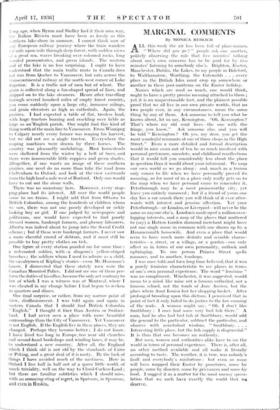MARGINAL COMMENTS
By MONICA REDLICH
ALL this week the air has been full of place-namesi " Where did you go ? " people ask one anot her, politely observing the rule that five minutes' talking about one's own concerns has to be paid for by live minutes' listening to somebody else's. Brighton, Exeter, Manchester, Dublin. the Lakes, to my people in Bideford, to Waltharnstow, Worthing, the Cotswolds . . . every place in the British Isles must crop up somewhere or another in these post-mortems on the Easter holiday.
Names which are used so much, one would think, ought to have a pretty precise meaning attached to them ; yet it is an unquestionable fact, and the plainest possible proof that we all live in our own private worlds, that no two people ever, in any circumstances, mean the same thing by any of them. Ask someone to tell you what he knows about, let us say, Kensington. "Oh, Kensington ? That's where my old aunt lives—the one with the fringe, you know." Ask someone else, and you will be told " Kensington ? Oh yes, my dear, you get the most wonderful remnants at one of those shops in the High Street." Even a more detailed and formal description would in nine cases out of ten be so. much involved with personal preference, anecdote, and childhood recollections that it would tell you considerably less about the place in question than it would about your informant. We map our own world as we go along ; and, much as a truism only comes to life when we have personally proved its meaning, so for most of us a place only really gets on to the map when we have personal cause to remember it Peterborough may be a most praiseworthy city, vet leave you entirely unmoved ; but if a friend of yours one day has a car smash there you will think of it ever after- wards with interest and genuine affection. Yet your Peterborough—or London, or Liverpool—will never be the same as anyone else's.- London is made up of a million over- lapping interests, and a map of the places that mattered to (say) a Hatton Garden diamond merchant might have not one single name in common with one drawn up by a Hammersmith housewife. And even a place that would seem to have much more definite and seizable charac- teristics—a street, or a village, or a garden—can only affect us in terms of our own personality, outlook and upbringing. To one person Princes Street spells romance, and to another, teashops.
I was once told, and fora long time believed, that it was a purely feminine characteristic to see places in terms of one's own personal experience. The word " feminine " was no compliment. Winchester, it was suggested, would mean to a mind like mine not a famous cathedral, not a famous school, not the tomb of Jane Austen, but the place where Aunt Louisa lost her shopping basket. After prolonged brooding upon this dictum, I perceived that in point of fact it only failed to do justice to the low cunning of the male. A woman might say, " Oh, I don't like Smithburg : I once had sonic very bad fish there." A man, had he also had bad fish at Smithbury, would add the general to the particular, subtract the particular, and observe with nonchalant wisdom, " Siithbury. . . . Interesting little place, but the fish supply is disgraceful." It is thus that one becomes an authority.
But men, women and authorities alike have to see the world in terms of personal experience. There is, after all, no other method available and all make it literally according to taste. The weather, it is true, was nobody's fault and everybody's misfortune : but even so some will have mapped their Easter by punctures, sonic by people, some by disaster, some by grievances and some by food. I suggest it as a matter for the most uneasy specu- lation that we each have exactly the world that wa, deserve.












































 Previous page
Previous page